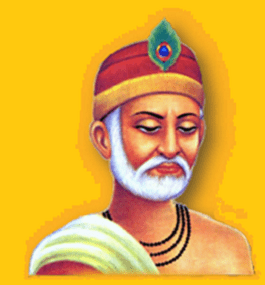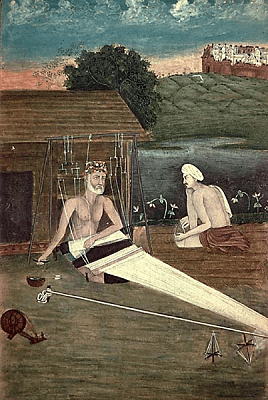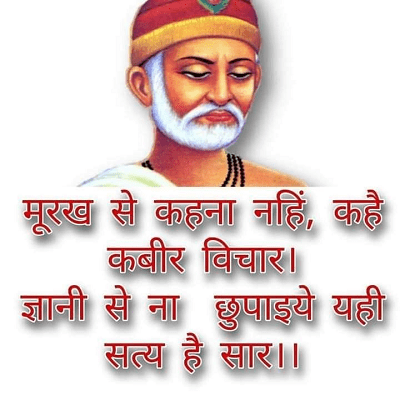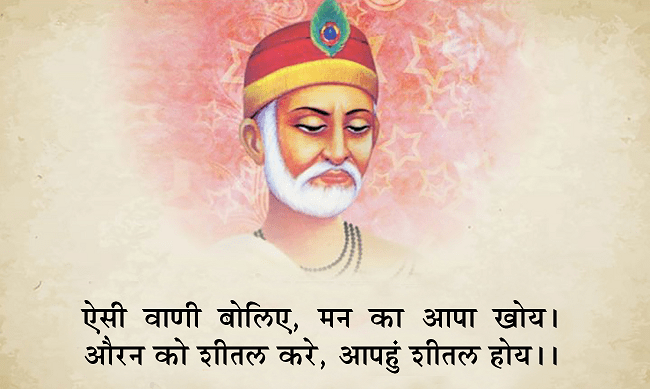Kabir Das - Biography

Kabir Das was a fifteenth Century Indian devotional writer and a pure saint whose compositions impacted the Bhakti progress of Hinduism. His sections are tracked down in Guru Granth Sahib, Sikhism’s sacred book. His initial days were in a Muslim family. Still, he was strongly impacted by his mentor, Ramananda, the Hindu bhakti pioneer.
Kabir Das, an otherworldly writer and extraordinary holy man of India, was brought into the world and passed on in the years 1440 and 1518, respectively. As per Islam, “The Great” is the literal meaning of the Kabir. Kabir Panth is the enormous religious group that distinguishes Kabir as the founder of the Sant Mat groups. The followers from Kabir Panth are called the Kabir panthis, who had expanded all around the focal and over north India. Sakhi Granth, Bijak, Kabir Granthawali, Anurag Sagar, and so on are a portion of the extraordinary compositions of Kabir Das. It is not realized about Kabir’s actual birth-givers; however, it is stated that he grew up with the poverty-stricken Muslim weavers. He was an exceptionally profound individual and turned into the great Sadhu. He got popularity all around the world on account of his persuasive practices and culture.
He received all his profound preparation from his Guru named, Ramananda, in his early days. At some point, he became a notable Guru Ramananda devotee. The place of the Kabir Das has obliged understudies and researchers for residing and concentrating on his extraordinary works.
There is no sign of the actual parents of the Kabir Das; however, it is viewed that an Islamic family took care of him. Lehartara, a modest town in Varanasi, is the place where he was taken care of by the Niru and Nima (his overseer guardians). His parents were poor and unschooled, yet they generously took on the little child and prepared him for their own business. He carried on with the simple lifestyle of a basic householder and a spiritualist.
Early Life and Foundation of Kabir Das

The long periods of Kabir's introduction to the world and passing are muddled. Several historians assert 1398-1448 as Kabir’s living period, while some claim 1440-1518.
Various legends about his real family and early life exist, conflicting in their subtleties. Kabir was gotten and afterward raised by a Muslim family. Notwithstanding, the present-day grant has deserted these legends for the absence of verifiable proof, and Kabir is generally acknowledged to have been raised in a family of Muslim weavers.
A few researchers express that the parents of Kabir might have been ongoing proselytes of the Muslim religion. They and Kabir were reasonably ignorant about conservative Islamic custom, and are probably going to have been following the Nath (Shiva Yogi) school of Hinduism.
Kabir is broadly accepted to have turned into the principal follower of the Bhakti writer- holy person Swami Ramananda in Varanasi, known for spiritual Vaishnavism with a solid twisted to monist Advaita philosophy instructing that God was inside each individual, everything.
It is broadly accepted that the Hindu holy person Ramananda obviously wouldn't acknowledge him as his follower authoritatively. However, Kabir cunningly acknowledged his devotees hood by covering himself in a cloth and lying on the means that drove the Ganges where Ramananda will undoubtedly go for a heavenly dunk in the stream before dawn: the holy person coincidentally contacted him with his foot and constantly cried "Rama, Rama!", having contacted him with feet and citing Hinduism's most blessed words (that turned into Kabir's "guru- mantra") were sufficient, in any event, for the standard Ramananda to acknowledge him as his pupil.
Kabir was never wedded and had a chaste's life. A few legends state that he resuscitated a dead kid named Kamal and a dead young girl named Kamali, who remained with him as his kids.
It is supposed that Kabir's family lived in the area of Kabir Chaura in Varanasi. Kabir matha, a matha situated in the back rear entryways of Kabir Chaura, praises his existence there (where he lived). Under the property, there is a house named Nirutila, where Niru and Nima's graves are kept.
Kabir Das’s Education
It is viewed that he got his devotional awakening from the Ramananda, master of the Sant Kabir. In the beginning, Ramananda was not consenting to acknowledge Kabir Das as his pupil. Long ago, Sant Kabir Das had rested on the stepping stools of the lake and perusing the mantra of Rama- Rama; in the early morning, Ramananda was going to take a bath, and Kabir descended underneath his feet. Ramananda felt regretful for that movement, and afterward, Ramananda had to acknowledge him as his pupil. It is accepted that the family of Kabir is as yet living in the Kabir Chaura, Varanasi.
Philosophies of Kabir Das

the current devotional flow of that time, such as Hinduism, Tantrism, and the individual spiritualism blended in with the imageless Islamic God influenced Kabir Das. Kabir Das is the principal Indian holy person who has composed Hinduism and Islam by giving a widespread way which could be trailed by the two Hindus and Muslims. As per him, each life has a relationship with two otherworldly standards (Jivatma and Paramatma). His point of view about the moksha is that it is the method involved with joining these two heavenly standards.
In his extraordinarily composed literature, Bijak has an enormous assortment of sonnets that clarifies Kabir's general perspective on divinity and spirituality. Kabir's Hindi was regional and straightforward, like his ways of thinking. He just followed the unity in God. The murti pujan in Hinduism has always been consistently dismissed by him, and he has shown absolute trust in bhakti and Sufi thoughts.
His Poetry

He had made the sonnets in a succinct and basic style resounding the respect for a verifiable master. After being an uneducated person, he had composed his sonnets in Hindi, blending in with Avadhi, Bhojpuri, and Braj. He was humiliated by certain individuals; however, he won't ever join in.
Heritage
Each sonnet and composition credited originally to the Sant Kabir still exists in a few dialects. Kabir and his adherents are named by his beautiful poetic reply, for example, banis and utterances. The sonnets are called differently as dohe, Sakhi, and saloka. Sakhi means to be retained and to remind the most important truth. The remembering, performing, and contemplating over these expressions involves the Kabir and every one of his supporters a way to the profound arousing.
Kabir Das’s Contribution to the Country
Kabir Das, a saint, a Bhakti and Sufi development holy person of the middle age India, is broadly known for his Bhakti development in North India. His life cycle is focused on the area of Kashi (otherwise called the Banaras or Varanasi). He was hereditarily connected with the cast of Julaha and weaving occupation. His massive commitment towards the Bhakti Movement in India is thought of as a spearheaded one alongside the Farid, Namdev, and Ravidas. He was a holy person of consolidated mysterious nature (Nath custom, Sufism, bhakti), which made him his very own distinguishing religion. He preached that genuine love and life are in the way of suffering.
Moreover, Kabir Das’s contributions to the literature, poems, and sonnets are huge and remarkable. There's a slice of life and philosophies in it. People read it; scholars study it to understand him. Kabir Das has shown a new path to reach God through his writings.
In the fifteenth century, almost every field of life of individuals in the Varanasi was unequivocally held by the Brahmin universality as well as learning centers. To make free individuals, Kabir Das needed to strive to teach his idealogy as he had a place with a low position (caste), Julaha. He never felt a contrast among individuals, whether they are prostitutes, below caste, or high caste. He taught all by social meets of him and his adherents. He was derided by the Brahmins for his proclaiming exercises; however, he never scrutinized them back, and that is the reason he was tremendously preferred by the average citizens. He began transforming the brain of common citizens towards the genuine truth through his couplets.
He generally protested ceremonial and parsimonious techniques as a means of salvation. He said that decency's diamond has more worth than the mines of diamonds. As indicated by him, one's heart with goodness incorporates all the thriving of the entire world. An individual with leniency has strength, pardoning has a genuine presence in him, and an individual with honourableness can undoubtedly accomplish an endless life. He taught that God resides in your heart and is always with you, so offer internal love to him. He had opened the psyche of ordinary citizens by one of his models that, if the voyager can't walk, how might the street at any point help explorer.
He opened the inner wisdom of individuals and showed them the certifiable lesson of mankind, profound quality, and other worldliness. He was a devotee and preacher of the ahimsa. He had turned the individual psyche of his period through his progressive teaching. There is no genuine evidence or piece of information about his introduction to the world and family; some say he belonged to a Muslim family, and some say he was from a high-caste Brahmin family. There was some conflict among individuals connected with the Muslims and Hindus about the memorial service framework after his passing. His life history is unbelievable despite everything showing the people genuine humankind.
The Religion of Kabir Das
As indicated by Kabir Das, genuine religion is a lifestyle individuals live and is not made on the individual’s own. As indicated by him, the work is love, and obligation is like religion. He said that carry on with your life, do liabilities and accomplish difficult work to make your life everlasting. Never disappear from the obligations of existence like having Sanyasa. He appreciated and esteemed the day-to-day life, which is the genuine significance of life. Likewise referenced in the Vedas, carrying on with life by venturing out from home and obligations isn't genuine dharma. Residing as a householder is likewise an incredible and genuine Sanyasa. Very much like, Nirguna sadhus, who carry on with day-to-day life, really buckle down for their day-to-day bread as well as serenade the name of God.
He has given individuals a legitimate reality about what religion of people the one ought to have. Such teachings of him have assisted the commoners with understanding the secret of life without any problem.
Kabir Das: A Hindu or a Muslim
It is viewed that after the demise of Kabir Das, Hindus and Muslims had asked to get the corpse of Kabir Das. Both of them needed to do the burial service of the corpse of the Kabir Das as per their own traditions and customs. Hindus expressed that they needed to burn the corpse as he was a Hindu and Muslims said that they needed to cover him in soil under the Mohammedan rituals as he was a Muslim.
Yet, when they eliminated the sheet from the dead body, they tracked down just a few blossoms at that spot. They disseminated the bloom between one another and finished the burial service as per their practices and customs. This is likewise viewed as that when both were battling, the soul of Kabir das came and said, "I was neither a Hindu nor a Muslim. I was both. I was nothing. I was all. I perceive God in both. There is no Hindu and no Musselman. To him, who is liberated from the dream, Hindu and Musselman are something very similar. Eliminate the cover and view the marvel!"
A sanctuary of Kabir Das is built at the Kabir Chaura in the Kashi, which has now turned into an extraordinary journey place for individuals all over India and outside India too. Furthermore, his Mosque was worked by the Muslims over the graveyard, which has turned into a religious journey for Mohammedans.